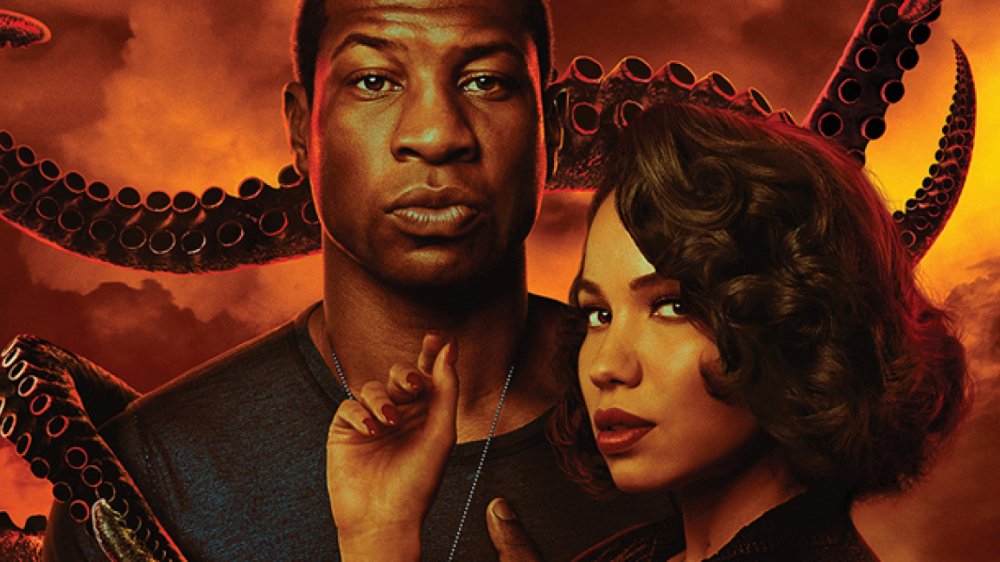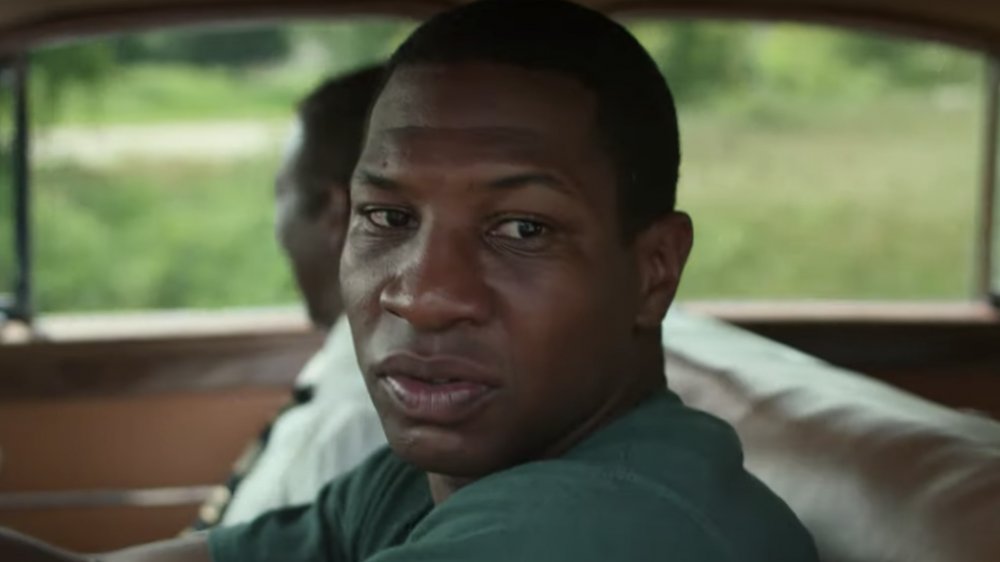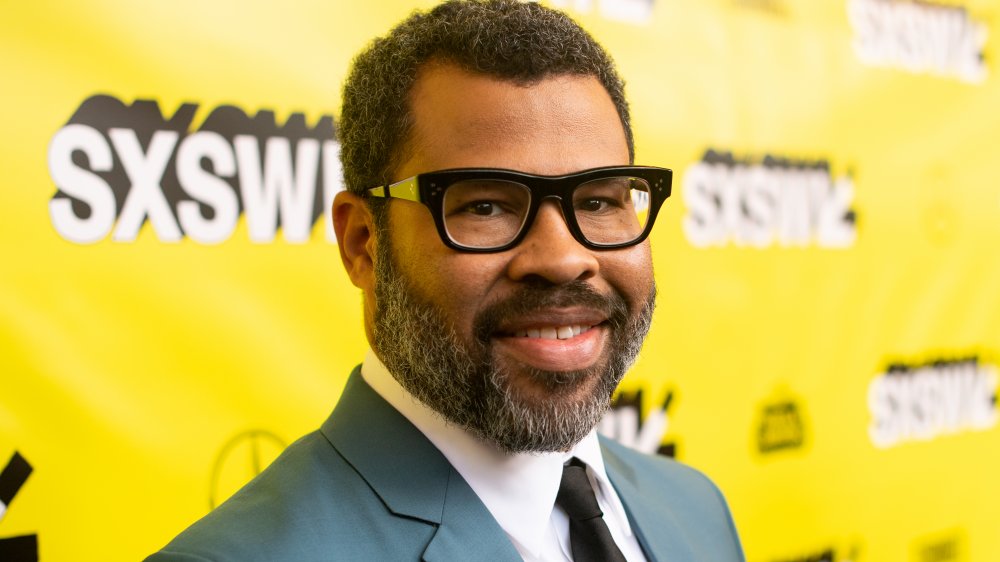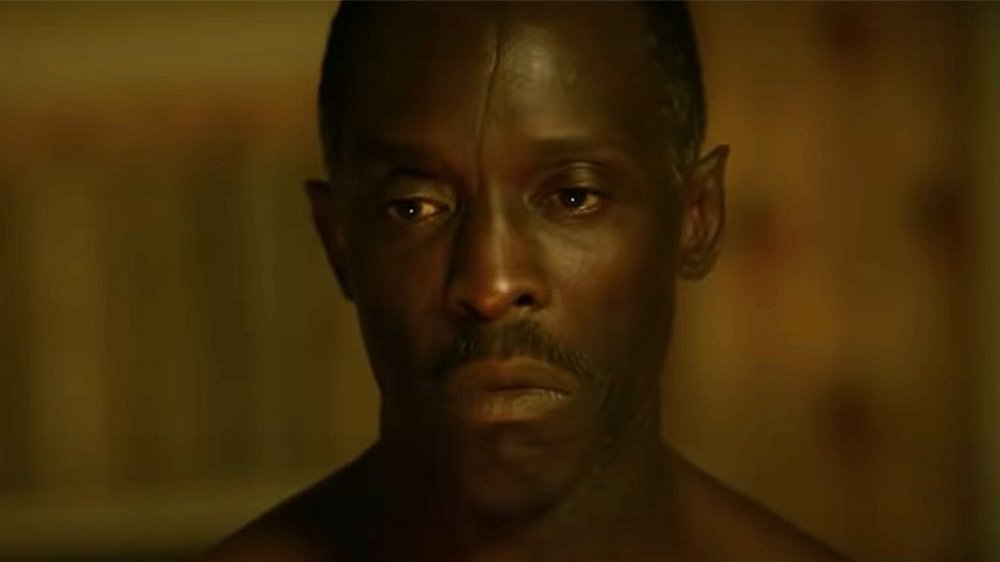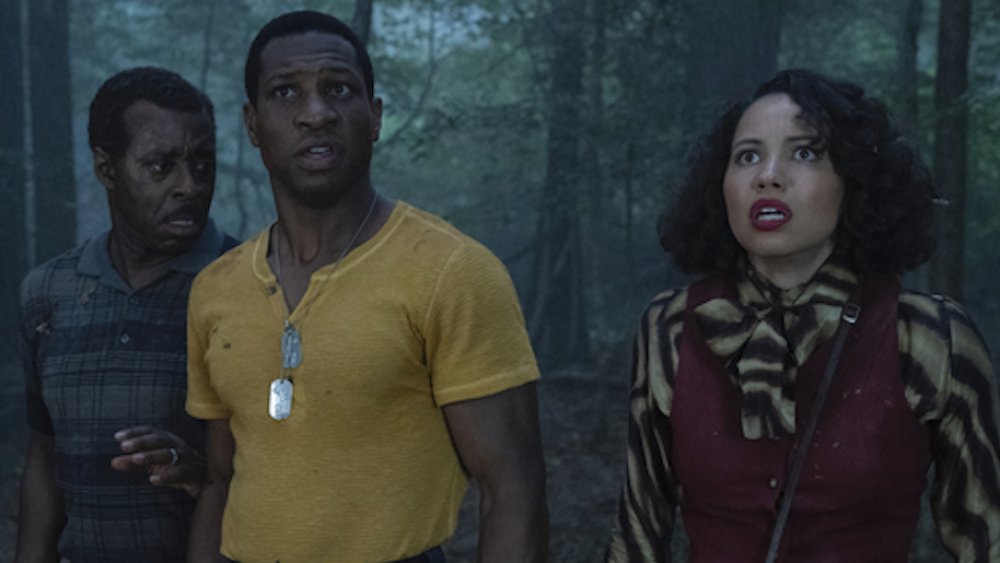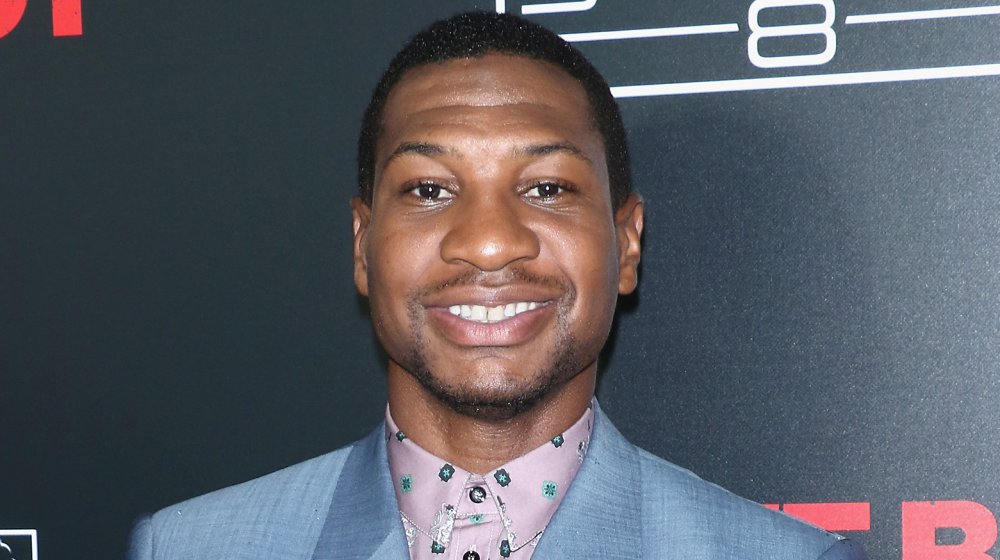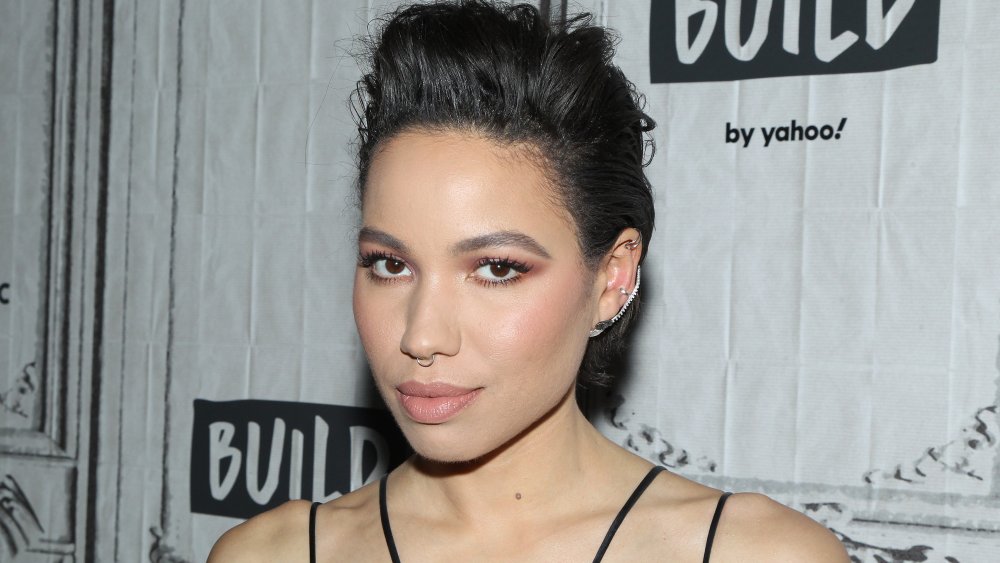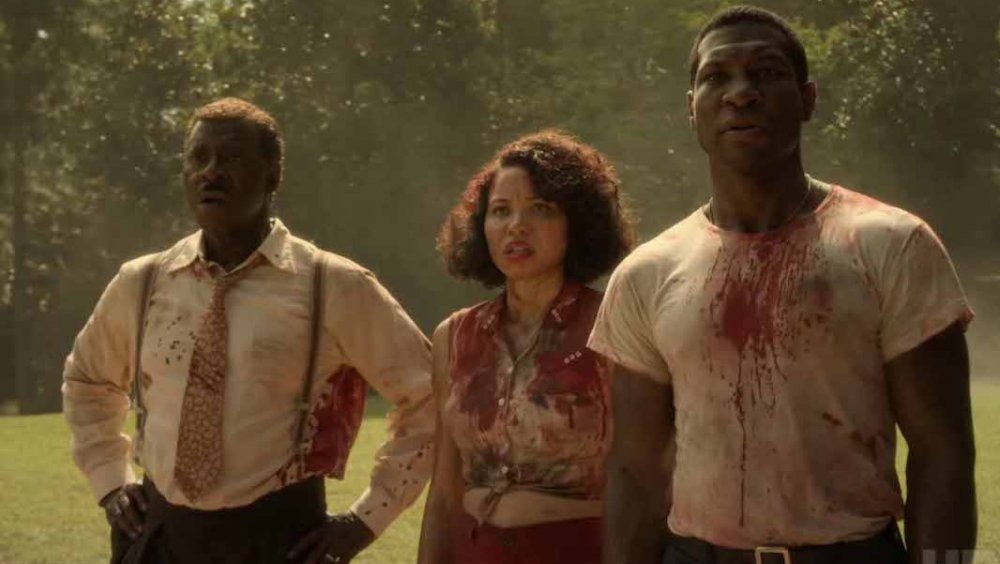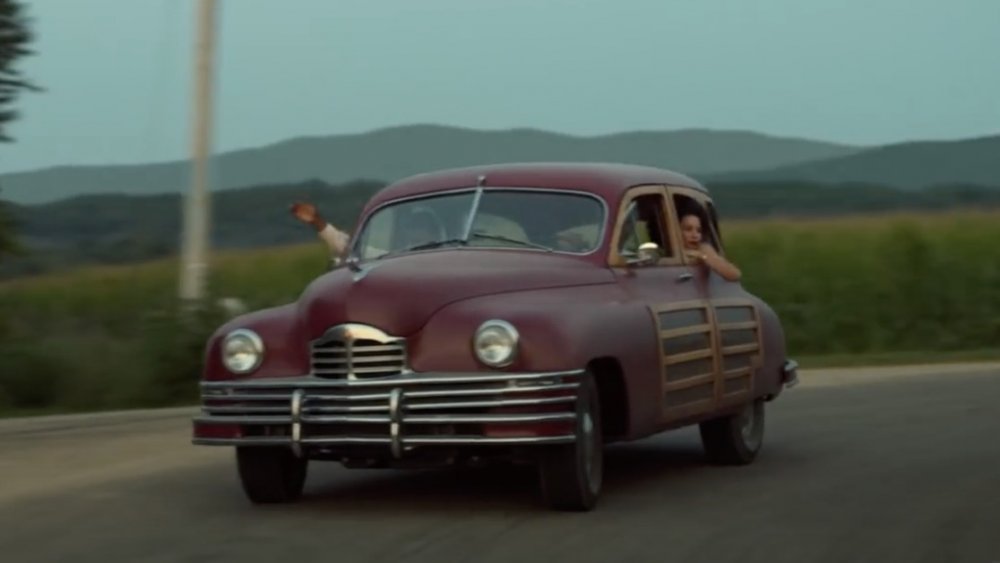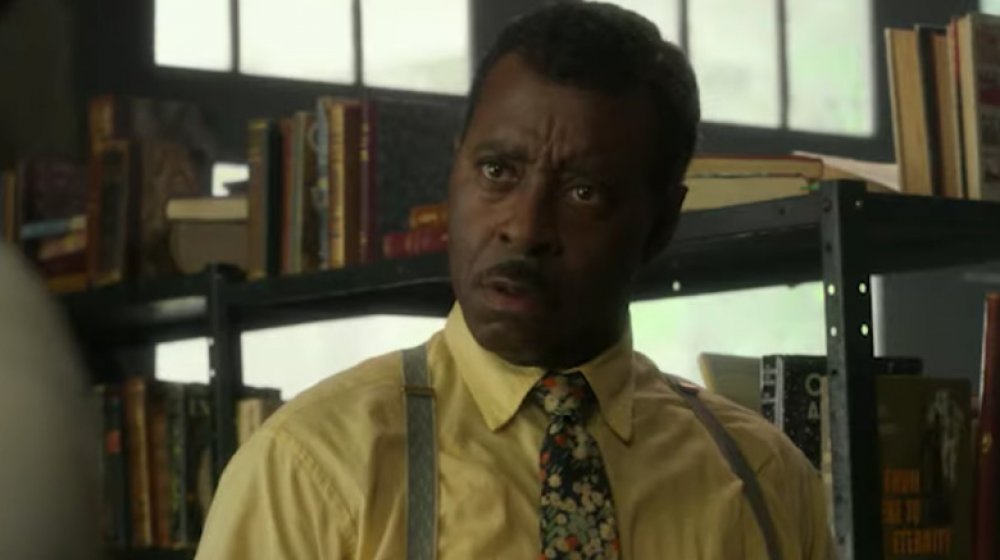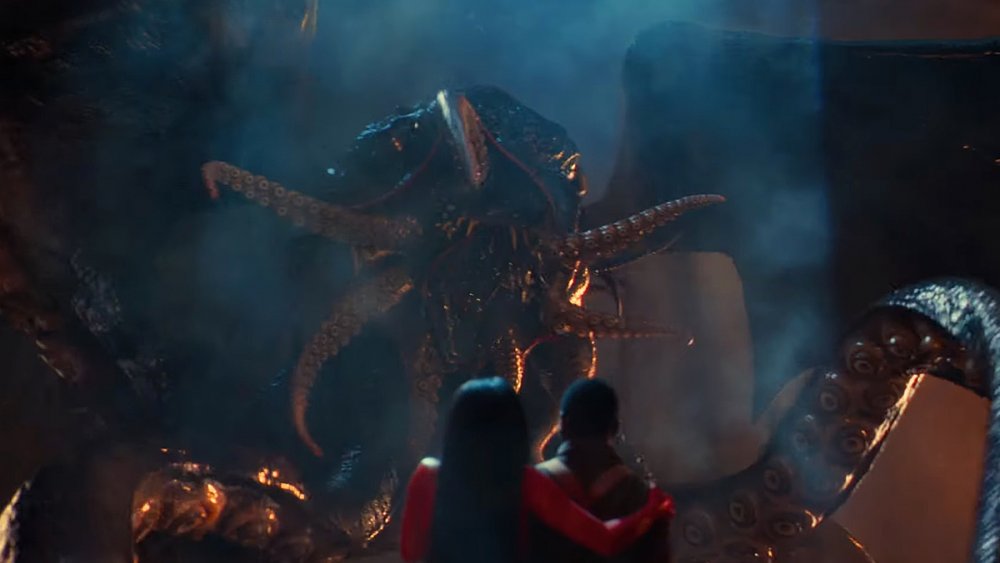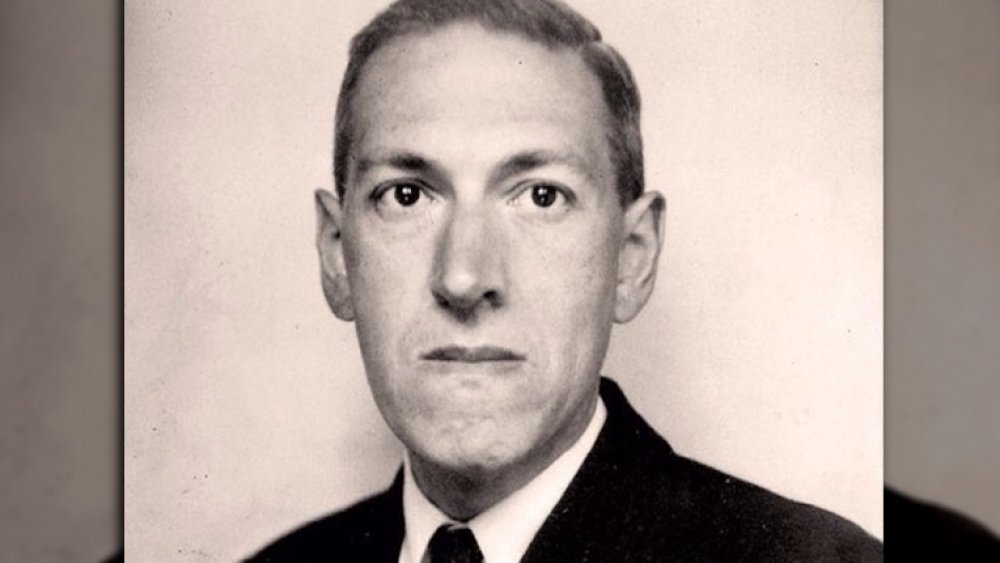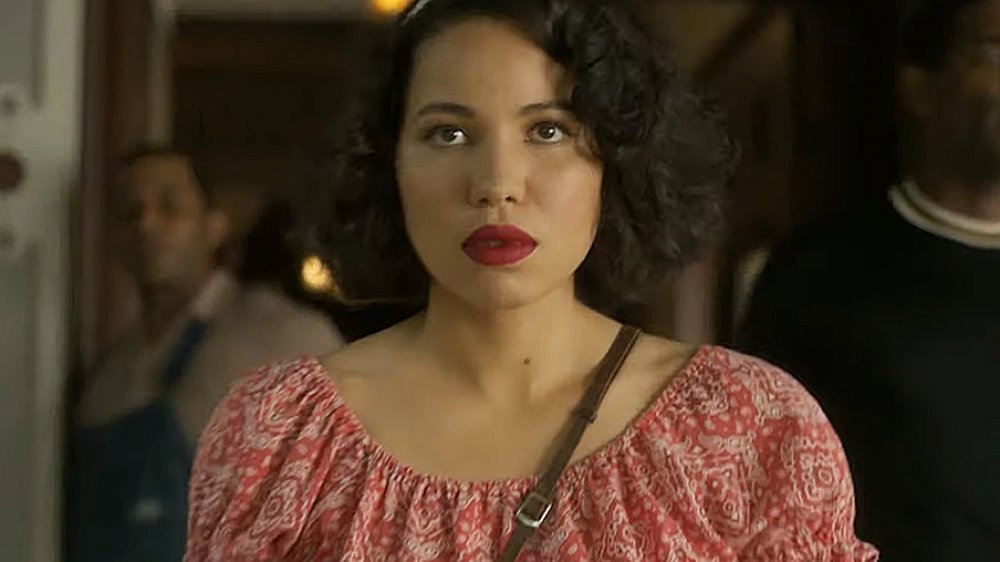Everything You Need To Know About Lovecraft Country
HBO, already an established home for prestige television, has been on a major hot streak, offering up such acclaimed small-screen masterpieces as Watchmen, I May Destroy You, and McMillion$. That run looks to continue with the August 16, 2020 premiere of Lovecraft Country. Based on Matt Ruff's genre-bending novel of the same name, the series is about three dauntless African-Americans on a road trip through the segregated South of the 1950s. Leading the group is Atticus Black (Jonathan Majors), a mega-fan of pulp science fiction and horror novels in search of his disappeared father, accompanied by his friend Letitia (Jurnee Smollett) and his uncle George (Courtney B. Vance). Along the way, the trio encounters terrors from small-town racists, secret societies, and unsettling monsters straight out of the novels Atticus loves so much.
Here's all there is to know before taking a trip into the ambitious, provocative, and terrifying world of Lovecraft Country.
It took a long time to make it to television
Published in 2016, Lovecraft Country is the sixth novel by author Matt Ruff, following well-received titles including Fool on the Hill and Bad Monkeys. Lovecraft Country, however, wasn't initially conceived as a novel. Oddly enough, when Ruff worked out the idea, he thought it would make for a great TV show, and wrote a novel "as a proof of concept for a possible series," as he said in a July 2020 press release. So Ruff wrote the book with the hopes that one day it would get optioned by Hollywood and turned into a television series, even though such an idea "was an extraordinary long shot." Ruff, who has also written in the TV-like, visual and sequential medium of comics, set up the book in an episodic fashion. Tor called Lovecraft Country "anthology-esque, a book of intertwining short stories."
Within a year, Ruff's wish-meets-gambit paid off. In May 2017, HBO ordered a series adaptation of Lovecraft Country. While a bunch of major industry players and their production companies signed on to bring the book to life, it still took more than three long years for the show to surface. The first episode wouldn't premiere on HBO until August 2020.
Lovecraft Country has an impressive creative staff
In 2017, just a few months after Jordan Peele released his thought-provoking, eventually Oscar-winning blockbuster horror movie Get Out, Deadline announced the comedian-turned-filmmaker's next project: An adaptation of Matt Ruff's 2016 novel, Lovecraft Country. Like Get Out, Lovecraft Country is a horror title with volumes to say about race relations in America. It was Peele who discovered the novel and brought it to Hollywood's attention.
Right out of the gate, Lovecraft Country boasted some major talent with the track record to bring such a unique project to the small screen. HBO ordered a season of episodes to be produced by Warner Bros. Television in association with Peele's Monkeypaw Productions and Bad Robot, founded by Star Wars, Star Trek, and Lost mastermind J.J. Abrams. Moreover, Misha Green, the co-creator, executive producer, and showrunner of the WGN America series Underground, signed on as executive producer, showrunner, and writer. Green argued that Lovecraft Country wouldn't be a viable TV show without the groundbreaking, previous work of Peele and Abrams. "I think this would have been incredibly hard to get on screen if Get Out hadn't come out. I think that paved the way for people to really open up to the idea of seeing more black people in genre spaces," Green said at a Television Critics Association press tour (via Deadline). "It's an epic journey that wouldn't have been possible if we weren't making TV at the level that started with Lost."
The Lovecraft Country cast is packed, too
With a dazzling group of acclaimed producers and creators to its name, along with its interesting and provocative source material, Lovecraft Country was able to attract an impressive, all-star cast. Portraying one of the lead characters, Letitia Dandridge, is Jurnee Smollett. This will be her return to HBO — she enjoyed a two-year stint on True Blood – and see her reunite with her Underground showrunner Misha Green. HBO stalwart Michael Kenneth Williams – Freddy Knight on The Night Of, Chalky White on Boardwalk Empire, and Omar Little on The Wire – stars as Montrose Freeman, Atticus' missing father. Acclaimed veteran character actor Courtney B. Vance, who recently won an Emmy for his work as Johnnie Cochran in American Crime Story: The People vs. O.J. Simpson, has a major role as Uncle George Black. And then there's relative newcomer Jonathan Majors, who looks likely to become a breakout star in the lead role of Atticus Black.
One major name who won't be in Lovecraft Country, however, is Elizabeth Debicki (Ayesha in Guardians of the Galaxy). Early on, the actor signed up to play the mysterious and villainous Christina Braithwhite, but had to drop out. Her replacement will Abbey Lee, of Mad Max: Fury Road fame.
The plot of Lovecraft Country
Lovecraft Country is an extremely original project, pulling from a number of disparate genres and histories. All at once, it's a period piece with a lot to say about systemic racism, a production promising genuine, horror story frights, and an exploration of midcentury science fiction. What's the actual story, you ask? Lovecraft Country is set in the United States of the 1950s, an era absolutely rife with violent, Jim Crow-era racism. The plot follows Atticus Black, a young, Black sci-fi enthusiast and Korean War veteran, his erudite uncle George, and his childhood friend Letitia as they embark upon a road trip in search of Atticus' missing father, Montrose Freeman. The three carefully travel through the hostile southern states, hoping to avoid horrific racism, a creepy secret society called the Sons of Adam, and more than a few monsters straight out of the works of H.P. Lovecraft. These wrathful creatures serve as a metaphor for the evils of racism... but are also connected to it. What happened to Montrose? What do the Sons of Adam want? You'll have to tune in to find out.
Jonathan Majors heavily prepared for his role
Portraying Atticus Freeman, Korean War veteran and sci-fi fanatic, in Lovecraft Country, caps a couple of years of attention-getting high-profile film roles for Jonathan Majors, following his work in Spike Lee's Da 5 Bloods and the festival hit The Last Black Man in San Francisco, which Majors told the New York Times represents an official trilogy pertaining to African-American masculinity. More broadly speaking, Majors acts because he considers it a calling, and that it satisfies his need to serve, rather than just to merely entertain, and the roles he picks reflects that. As such, he prepared extensively for his role in Lovecraft Country.
"The first thing I do when I start a role is I look to see where we're similar," Majors said. "I played sports my entire life; that speaks to the physicality of Atticus." Prepping the imagination of the character — one victimized by racism and violence — was more difficult. "I had to go to places of remembering when I was beaten up so bad in school that I retaliated and ran to my apartment building and grabbed a knife and was chasing the bully down the street — like, the fear I had pulsing through my body."
Jurnee Smollett campaigned hard for her role
Portraying one of Lovecraft Country's primary roles of Letitia Lewis, Atticus Freeman's traveling partner and childhood friend with whom things have grown complicated in adulthood, is veteran actor Jurnee Smollett, best known for her roles as Michelle's best friend Denise on Full House, Black Canary in Birds of Prey, and Rosalee in Underground, the WGN America series about the Underground Railroad co-created by Lovecraft Country creator and showrunner Misha Green. That proved to be a roadblock — Smollett and Green didn't get along. "We did the pilot and I hated her," Smollett told The Hollywood Reporter. "We proceeded to be the worst of enemies for the first two months of shooting," an assessment Green confirmed.
When she signed on to make Lovecraft Country, however, Green knew that Smollett was the right actor to play Letitia, but resisted at first. "I just didn't want to be one of those people who only works with [performers] they've worked with before." Smollett was determined to get the part, as she was a huge fan of Matt Ruff's source novel of the same name, and tracked the show's development progress, and didn't understand why it took Green a long five months to offer her the role. "Does she not think I can stretch and do a different character?" Smollett asked rhetorically. "I mean, I was freaking out, literally losing sleep for months."
There are some wild theories about Lovecraft Country
Tantalizing bits of the world of the highly anticipated Lovecraft Country leaked in the months before its debut, such as set photos and an official trailer. By that point, fans in the making had already formed elaborate — and wild — theories about the show and its supposed hidden meanings and secret connections to other works of popular culture. (It's worth noting that many of these notions seem to be completely divorced from the show's definitive source material: Matt Ruff's 2016 novel Lovecraft Country.) One theory holds that Lovecraft Country is connected to HBO's recent reimagining of the Watchmen comic, supposing that the latter's Sister Knight (Regina King) ingested Atticus Black's chemical Nostalgia to stop the 7th Kalvary. Other theorists suggest a link to executive producer Jordan Peele's Get Out, in that Atticus Black's journey is a mental adventure experienced deep in "The Sunken Place." Some fans even think the show's monsters are somehow being hunted by an early incarnation of Marvel's Agents of S.H.I.E.L.D., or that they're time-traveling aliens warning Atticus Black of future peril.
A crew member got hurt during filming
HBO gave Lovecraft Country the green light in 2017, and after the series assembled its cast, crew, and scripts, production began in earnest in the summer of 2018, more than two years before its scheduled premiere date. While the book and series takes place largely in the southeastern United States, the show actually filmed around northern Illinois, specifically in the communities of Woodstock, Hebron, Marengo, LaSalle, and the west side of Chicago, all dressed to look like the 1950s. A sequence shot in Elburn, Illinois, was the site of a mishap that left a crew member hurt. In the suburban area, the Lovecraft Country production was attempting to film a car case scene. Four people were inside a stunt car and a camera operator was riding on top of the vehicle in a small pod when the driver lost control and it tipped over. No one inside the car got hurt, but the camera guy did — he was treated on site by medics for minor injuries and was given a clean bill of health.
There's a parallel with the movie Green Book
Up until a few years ago, The Negro Motorist Green Book was a little-known but fascinating relic of American and segregationist history. Between 1936 and 1966, an African-American postal worker named Victor Green published annual directories advising African-American travelers as to which hotels, restaurants, nightclubs, bars, salons, and gas stations would accept their business. Green's books (distributed under various names) covered locales all over the world but which were particularly valuable in the South, where businesses openly segregated or refused African-American patrons until the Civil Rights Act of 1964 made such practices illegal. All of these concepts were brought to mass attention by Green Book, the based on a true story 2018 Academy Award winner for Best Picture about a white man who drives an African-American concert pianist through the segregated '60s South. HBO's Lovecraft Country also explores the importance of The Green Book but in a much more personal and provocative way. Part of Atticus Black's traveling group is his uncle, George Black (Courtney B. Vance), the highly and usefully informed author of The Safe Negro Travel Guide, an obviously fictionalized version of The Negro Motorist Green Book.
HBO spared no expense
Lovecraft Country has a lot to say, and its creative team aims to tell its story in exciting and original ways. Fortunately, HBO and the production companies involved seem to be committed to providing the vast financial resources necessary for that to happen. Showrunner Misha Green mentioned at a Television Critics Association event (via Deadline) that the ten-episode first season of Lovecraft Country required the use of 162 built sets. Green also estimates that the show boasts such a high, premium cable budget that one episode of Lovecraft Country costs as much to make as it took to make five episodes of Underground, the last episodic television series she ran.
"The visual effects houses we've been working with, the makeup special effects places we've been working with — they're some of the biggest. They make Star Wars movies," Green added. "There's no limits other than my imagination, which is fantastic."
Lovecraft Country is a complicated place
Country. It's merely a suggestive metaphor to hint that terrible, life-and-soul killing monsters of all kinds are just around the corner, ready to strike protagonist Atticus Black and his fellow 1950s Deep South travelers. The "Lovecraft" refers to H.P. Lovecraft, a pioneer in science-fiction and horror literature who laid out a lot of those genres' standards and tropes which are still used today. Lovecraft also helped initiate the notion of a unified fictional world in which to set multiple, otherwise not explicitly connected works — not unlike the Marvel Cinematic Universe or Harry Potter's Wizarding World. Lovecraft set many of his stories in fake towns within Massachusetts' real Essex County. Some Lovecraft scholars refer to the area as the "Miskatonic region," after a fictional river and university found in those fictional works, while the Lovecraftian game Call of Cthulhu spread the phrase "Lovecraft Country."
However, the term "Lovecraft Country" as the title of a show about racial issues is also a subtle criticism of that author's worldview. H.P. Lovecraft had some controversial opinions on race, so in other words, "Lovecraft Country" is a metaphor for "racist stuff." For example, he espoused anti-Semitic conspiracy theories, sympathized with Hitler, and justified anti-Black violence in the South, Matt Ruff's novel Lovecraft Country and the HBO adaptation grapple with Lovecraft's legacy — yes, he was extremely important and indelible in the development of genre fiction... but he wasn't the most progressive individual.
Lovecraft Country is a historical show relevant to the present day
While Lovecraft Country is set in the past — albeit an alternate version of the past, a 1950s America where literal monsters are a legitimate threat to the protagonists — its themes still resonate today. Lovecraft Country is primarily about Black characters traveling through a country where "sundown towns" exist — where Black people can be attacked with no recourse if they're in public at night. That's a show that hits HBO in August 2020, mere weeks after massive nationwide protests called for an end to police brutality, systemic racism, and a reinvigoration of the Black Lives Matter movement.
During a Lovecraft Country panel at Comic-Con@Home 2020, star Jonathan Majors (Atticus Freeman) read a scene in which his character is pulled over by a white police officer during his travels, and he could relate to the fear and uncertainty Atticus feels. "Literally on the top of my script for that scene I wrote, 'The worst day in Texas,' where I grew up," Majors told Variety. "That is the type of thing my mama would pray over me when I would travel — pray that wouldn't happen." He added, "You notice in that scene, it's just people, you understand," he told Gizmodo. "That's what we're talking about; that's what we're showing in technicolor." His co-star Courtney B. Vance all but labeled Lovecraft Country vital viewing, calling it (via /Film), "so different, and so engaging, especially in this time period we're living in now."
